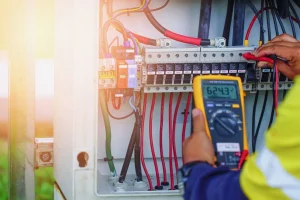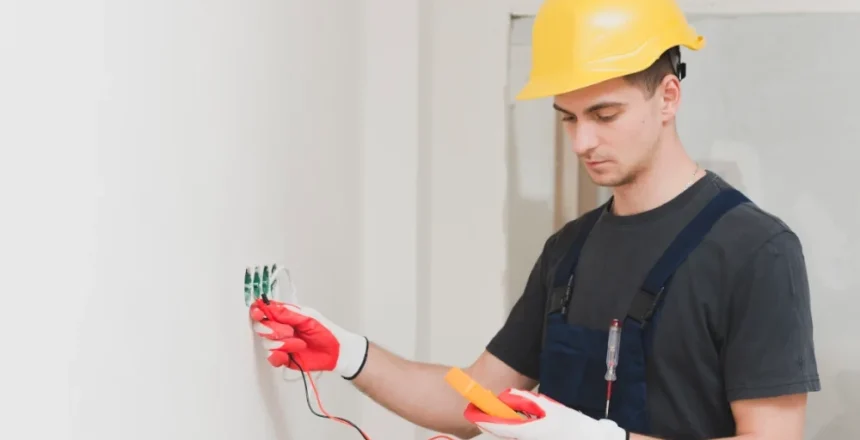For individuals leading active lives, ensuring home safety is paramount. How often should I get electrical inspections? plays a crucial role in preempting potential hazards. By detecting and addressing issues promptly, homeowners can uphold a secure environment that aligns with their dynamic routines. These inspections not only prevent risks but also provide peace of mind. Stay tuned to explore how proactive measures like routine electrical checks can bolster safety for those with active lifestyles.
Key Takeaways
- Frequent inspections ensure safety and efficiency in active households.
- High usage levels warrant more regular electrical checks.
- Timely inspections prevent hazards from compromising safety.
- Addressing potential issues promptly supports an active lifestyle.
- Routine inspections mitigate risks and promote a safe environment.
Importance of Regular Electrical Inspections
Regular electrical inspections are essential for maintaining the safety and functionality of your home’s electrical system, especially for individuals leading active lifestyles. These inspections help identify potential hazards like faulty wiring or overloaded circuits, preventing dangerous situations. By ensuring that your electrical system is up to code and in good working condition, you can enjoy peace of mind and a safe environment for your daily activities.
Frequency Guidelines for Electrical Inspections
When considering the frequency of electrical inspections, it is important to follow industry recommendations to maintain the ongoing safety and efficiency of your home’s electrical system. Typically, residential properties should undergo a thorough electrical inspection at least every 5 to 10 years. However, homes with active lifestyles, characterized by frequent appliance use or DIY electrical projects, may benefit from more frequent inspections, such as every 3 to 5 years.
Impact of Active Lifestyles on Inspection Needs
In homes with active lifestyles, characterized by frequent appliance usage and DIY electrical projects, the need for more frequent electrical inspections becomes crucial to guarantee ongoing safety and efficiency of the electrical system. Increased wear and tear from high usage levels can lead to potential hazards if not promptly addressed. Regular inspections help mitigate risks and make certain that the electrical system can support the demands of an active household.
Signs Indicating the Need for Immediate Inspection
Evident indications such as flickering lights, burning odors, or frequent tripped circuit breakers are clear signals necessitating an immediate electrical inspection to address potential safety concerns. These warning signs may point to underlying issues that could pose serious risks, making prompt evaluation essential to prevent electrical hazards that may compromise the safety of your home and those within it.
Maximizing Safety Through Routine Inspections
Regular electrical inspections play an important role in maintaining a safe environment for individuals with active lifestyles, ensuring that potential hazards are identified and addressed promptly. By conducting routine inspections, homeowners can maximize safety by proactively identifying faulty wiring, overloaded circuits, or outdated electrical systems. This preventive approach helps mitigate the risk of electrical fires and other safety hazards, providing peace of mind for those leading active lives.

Frequently Asked Questions
Can I Perform My Own Electrical Inspections at Home?
Performing your own electrical inspections at home is not recommended due to safety concerns and the technical expertise required. It is advised to hire a licensed electrician for thorough and accurate assessments to ensure maximum safety and compliance.
Are There Specific Areas in My Home That Need More Frequent Inspections?
Certain areas in your home, like kitchens, bathrooms, and outdoor spaces, often require more frequent electrical inspections due to the presence of water and moisture. Regular checks in these high-risk zones are essential for safety.
What Are the Potential Risks of Skipping Regular Electrical Inspections?
Neglecting routine electrical inspections can lead to unseen hazards like faulty wiring, outdated systems, and potential fire risks. Regular inspections are essential to maintaining a safe living environment, ensuring electrical systems are up to code and functioning properly.
Is There a Difference Between Electrical Inspections for Older Homes Vs. Newer Homes?
When it comes to electrical inspections, the approach for older homes versus newer homes can vary. Older homes may require more thorough assessments due to aging infrastructure, while newer homes may focus on compliance with current codes and standards.
How Can I Find a Qualified Professional for Electrical Inspections?
To find a qualified professional for electrical inspections, start by verifying their credentials, such as licenses and certifications. Seek recommendations from trusted sources, review online reviews, and inquire about their experience with your specific type of property or electrical system.
Conclusion
Finally, regular electrical inspections are essential for maintaining home safety, especially for those with active lifestyles. By following recommended frequency guidelines and being vigilant for signs of potential hazards, homeowners can guarantee their electrical systems are in best condition to support their daily activities. Prioritizing routine inspections not only reduces risks and prevents dangerous situations but also offers peace of mind knowing that the home is a secure environment for all occupants.
You May Also Like To Read:
